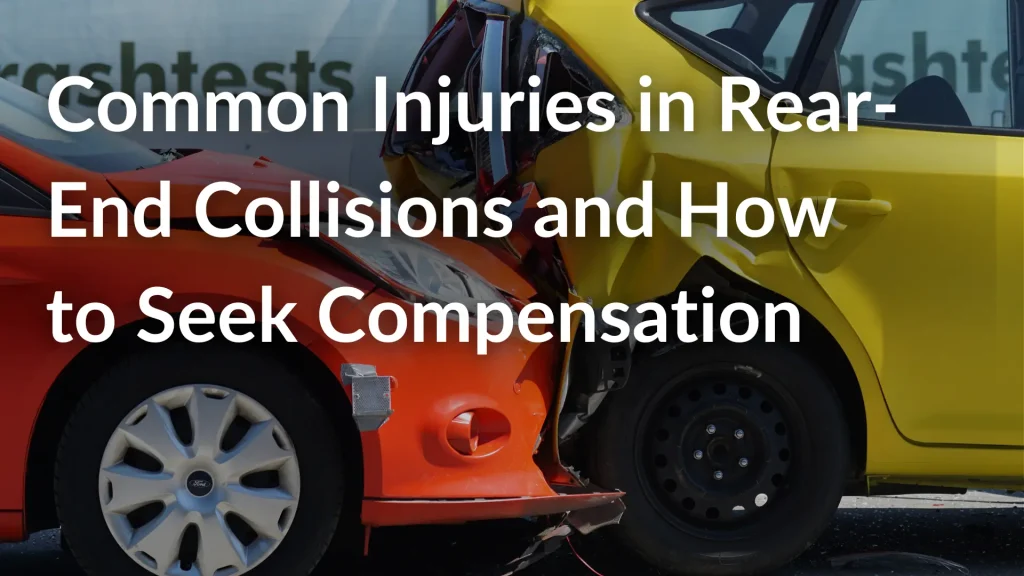Posted on Tuesday, April 1st, 2025 at 9:00 am
 Rear-end collisions happen daily and are one of the most common car accidents, so what do you do after?. While some may seem minor, they often cause serious injuries that can affect victims for months or even years. If you or a loved one has been hurt in a rear-end crash, it’s essential to understand your options for securing compensation for your rear-end collision injuries. The proper legal support can help you seek rear-end collision injuries and compensation to get the financial recovery you need to move forward.
Rear-end collisions happen daily and are one of the most common car accidents, so what do you do after?. While some may seem minor, they often cause serious injuries that can affect victims for months or even years. If you or a loved one has been hurt in a rear-end crash, it’s essential to understand your options for securing compensation for your rear-end collision injuries. The proper legal support can help you seek rear-end collision injuries and compensation to get the financial recovery you need to move forward.
Common Injuries in Rear-End Collisions
Rear-end accidents can cause several types of injuries. In severe cases, victims may have to go through extensive medical treatment. Common injuries in rear-end accidents include:
Whiplash Injury
When a car is hit from behind, the sudden force causes the head to jerk forward and then snap back. This violent motion can stretch and tear neck muscles, ligaments, and tendons. Whiplash symptoms don’t always show up right away. However, when they do, they may include a stiff neck, headaches, dizziness, and trouble moving the head. Some victims deal with pain for weeks, while others suffer long-term effects like chronic headaches and reduced mobility, factors that can impact a personal injury settlement significantly.
Soft Tissue Damage
The impact of a rear-end crash doesn’t just affect the neck. It can also cause soft tissue damage throughout the body. Muscles, tendons, and ligaments in the shoulders, back, and even arms may be stretched or torn. This can lead to bruising, swelling, and significant pain that limits movement. Recovery may take weeks of physical therapy, and in severe cases, permanent damage can lead to ongoing discomfort or weakness.
Head and Brain Injuries
Even if the head doesn’t directly hit anything, the force of a rear-end crash can shake the brain inside the skull. Concussions and traumatic brain injuries (TBIs) are common causes of accidents, especially if there is a sudden jolt. Symptoms may include confusion, dizziness, nausea, and sensitivity to light or sound. More serious brain injuries can lead to lasting cognitive issues, memory problems, or changes in personality. Seeking medical attention right away is critical, as some brain injuries may not be immediately noticeable.
Back and Spinal Cord Injuries
The spine absorbs a lot of force in a rear-end collision, making back injuries a serious concern. Herniated discs, fractures, and spinal cord damage can result from the sudden impact. Some injuries may cause chronic pain that makes daily activities difficult, while more severe spinal damage could lead to permanent mobility issues. Treatment can involve surgery, physical therapy, and long-term pain management.
Broken Bones and Fractures
Many victims of rear-end accidents suffer broken bones, particularly in the wrists, arms, and ribs. The natural reaction to brace for impact often results in fractures when hands or arms hit the dashboard or steering wheel. Rib fractures are also common due to seat belt pressure. These injuries may take months to heal and require surgery and physical therapy.
Psychological Trauma and Emotional Distress
Physical injuries aren’t the only effects of a rear-end crash. Many victims develop anxiety, post-traumatic stress disorder (PTSD), or emotional distress following the accident. Fear of driving, sleep disturbances, and depression can interfere with daily life. Emotional trauma is a valid part of rear-end collision compensation, and its impact shouldn’t be overlooked, especially when you also file a claim for lost wages from a car accident that disrupted your ability to work.
How Compensation Works for Rear-End Collisions
In most rear-end crashes, the driver who hits another vehicle from behind is at fault. Drivers are expected to keep a safe following distance, so they are usually held responsible when they fail to stop in time. However, there are exceptions. If the front driver suddenly brakes without reason or has non-working brake lights, liability may be shared or disputed.
The Car Accident Claims Process
Getting medical care should be the top priority after a rear-end crash. Some injuries may not be obvious immediately, but delaying treatment can worsen them. Following all medical recommendations is also important, as insurance companies may try to deny compensation if a victim does not follow a doctor’s orders.
Filing an Insurance Claim
After getting medical care, the next step is to report and file an insurance claim. Victims should let their insurance company know about the accident and share any important documents they have. Keeping records of medical treatments and expenses is crucial, especially when exploring the types of rear-end accident lawsuits and outcomes that could apply to your case.
Compensation for Rear-End Collision Injuries
 Victims of rear-end accidents may be eligible for different types of compensation, including:
Victims of rear-end accidents may be eligible for different types of compensation, including:
- Medical expenses after a car accident – This may include hospitalization, surgery, or long-term care, like rehabilitation.
- Lost wages – This can include any wages lost from taking time off to recover, or any lost earnings from being forced out of work permanently.
- Property damage – Injured people can recover compensation to repair or replace their vehicle and other personal property damaged in the crash.
- Long-term effects of rear-end collisions – This money is meant to compensate you for any permanent disability or chronic pain, scarring, or disfigurement resulting from the crash.
Challenges in Rear-End Car Accident Claims
While many claims go smoothly, some victims face roadblocks when seeking rear-end collision compensation. Insurance adjusters often try to pay as little as possible, offering settlements that might not fully cover your medical bills or lost wages. Sometimes, insurance companies deny claims because they disagree about who was at fault or say there isn’t enough medical proof of the injuries. Understanding how to challenge these issues can significantly affect the final settlement.
Please read more about insurance adjusters here: How to Scare an Insurance Adjuster
When to Consult a Personal Injury Lawyer
Handling rear-end car accident claims on your own can be stressful, especially if you’re hurt and trying to deal with insurance companies at the same time. A lawyer can remove some of that pressure by gathering evidence for your claim and handling conversations with the insurance adjusters.
Call Our Rear-End Collision Lawyers Today
At Farris, Riley & Pitt, LLP, we fight hard to help each client pursue a fair settlement after an Alabama car accident. We help victims throughout Birmingham, Mobile, Montgomery, and all of Alabama fight for the compensation they need.
We offer free consultations to discuss your case and explain your legal options. Our team is here to help you understand your rights and take the first step toward securing the necessary benefits. Call (205) 324-1212 or contact us online today to get started. Your recovery matters, and we are here to help.















